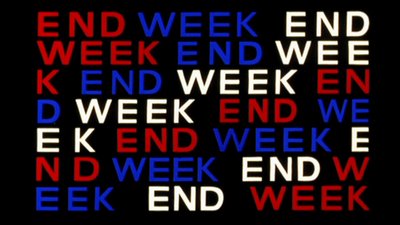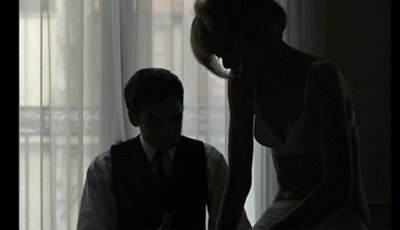Godard's Weekend

In fact, after watching Contempt, I thought of Godard as an academic film maker, not a film maker of ideas. Contempt remains one of the most bizarre films that I watched last year, if we look at the cinematic style, which is not brilliant because it makes a style of its own, as several fine films do, but it breaks down the conventions of film making which we usually accept as rules, thus helping us to see film making in parts, as a brick work of those raw materials. Contempt breaks several existing rules in the book and it tells us that there is no limit to creativity and visual imagination - the imagination in mixing the moving images, the sound and the ideas and the worldviews. Contempt has all what one will expect from a film maker who is known to break into and jump over fences. But Contempt should not be Godard's introductory film, as it was in my case. Its like an infant meets enfant terrible. Kid cries and listens to commentary track. I think what Contempt lacks is the flow of ideas. Although there is Brecht peeking in every frame but that alienation is not used to give us thoughts which Brecht talked about. Contempt has all the masters tricks but does not have much use apart from their display. The commentary track tells us about all those esoteric references and all those rules that are broken in front of our eyes but a normal viewer will think why they are broken, where is that greater good that is achieved by breaking them. I am undoubtedly confused when I saw Contempt. And yesterday that doubt is cleared when I saw Weekend, a film by Jean-Luc Godard.

A couple makes a mysterious plan to inherit the money from their parents and they leave their home to accomplish the mission. After some time, the questions like whether they will succeed and who will get the money (The couple even plots to murder the each other after getting the money and each of them have lovers, they are all in all bad people, but they are not some one off case, they are caricature, metaphorical and representative) and the whole narrative thrust of "what will happen next" becomes so insignificant that only the couple thinks about it but the film takes it own course. Its funny to see film not going where the main characters will like it to go. The film is denying them any heroic or anti-heroic significance. There is not much to talk about what happens in this film, but there is lot to talk about how it happens and how the expectations of the viewers are crushed again and again, and what he gets is, as one early inter-title says, a film adrift in cosmos. It may look as if different parts of this film are scattered but as the film progresses, it takes a shape of ideas that the film wants to convey. Distancing the viewer from what is shown on screen to what director wants to say. The film is polemic and very direct in that way. We hear monologues on Marxism and Maoism (which is criticised by some critics as didactic and over the top), and we hear French revolutionary Saint, narrate us the ideas of liberty.
In a delicate episode, a piano player remarks something that is so profound. He says about Mozart, "Mozart is too easy for beginners and children, too difficult for virtuoso". These types of episodes are particularly dear in the way they are crafted, free and without any text book format, camera pans leisurely to show people standing and sitting as the piano man plays Mozart, the way it is placed next to the car-chaos of cities and highways. Mozart music relates to the serenity of the place. The look on the faces of the village people listening to music and the couple, as insensible as they are shown, could not care less and look immensely bored by it. They want to move on, and the director wants to show another such episode. Beautiful conflict, that Godard uses to bring across his idea of industrial imperialism and bourgeoisie sham, to name a few. All those time tested plot tactics of sex, murder and deceit, that Godard show in the beginning, lead us nowhere, and Godard takes us to an absurdist journey hopping into bourgeoisie, Marx, slapstick, satire, literature, philosophy, civilization, class society, music, pop art, parody, politics, activism and cannibalism.

Cinematic conventions are twisted in each frame. The sound and image are almost always incoherent. The background score becomes gloomy, it heightens and it dissolves for apparently no purpose. There are inessential details, like the time, its Saturday - 10 am, another five minutes have past, the kms in the speedometer etc, as if viewer will want to keep track of it. It has the shadows of commercialization everywhere, and cars becoming a big symbol of it. Anything that uses oil and moves is ridiculed by Godard, including humans. The very famous, 8 min tracking shot of a traffic jam shows us a view of Parisian life, blood, dead bodies, animals, daily life conflicts and different sizes of cars. In an accident, a lady screams that she has lost her designer purse, in a very interesting episode, the lead couple burns Emily Brontë because she is not giving answer to their question, in the same scene, Brontë asks them GMAT type questions. The discussion between a young rich girl and a tractor driver is directly out of Communist manifesto's first chapter, the Bourgeoisie and the Proletarian. Towards the end, the hilarious orgy which was narrated earlier in the film (see the narration of this orgy scene in contrast to that of Bergman's Persona), is actually performed, but in a very unexpected and hellish way, and the film moves from bourgeois houses to countryside to guerrilla jungles and amidst all this chaos, Godard's version the living hell emerges. Unlike Contempt, this film fills those detachment gaps with solid ideas and radical thoughts.
For me, this film became a unique experience. After watching Weekend, I rushed to see Munich, and it is such a contrast in approach, although its unfair to compare both, but you cant help it when you watch them back to back. Weekend looked like a 'View source' of Munich's pretty HTML page, to put it in a slapstick way. I have starting feeling contempt for all those high risk saving scenes (the one where the Arab ambassador's daughter was saved in Munich) after watching Funny Games and Code Unknown (there is similar scene in Code unknown where a toddler is saved while his parents frolic in swimming pool, that scene has an ultimate concoction of sex, skin show, family love, hyped excitement, hope and happy ending). Munich manufactured everything in detail while Weekend deconstructed every detail. Munich used emotions to take its point across and Weekend used mechanical monologues and chaotic imagery. In Munich, every act of violence is regretted with heroic closeups, in Weekend, there is no remorse when the rabbit of Monsieur Flaubert is killed. Before sleeping, I gathered what was Munich all about while traffic cars honked endlessly, a cyclist thrown off pavement by a honking car, car ran down by big truck and so on.

Weekend took a step further in what I thought movies like Code Unknown can do. Code Unknown episodes have reality, they are even emotional. But Weekend, at times, looks unreal, but like a near future of our civilisation - its end, it horrifies and jolts. Weekend is unapologetic in being prophetic. Weekend is meant to irritate and to frustrate, it may look insane to people, it is actually a caustic, mean film, grotesque, as some may say "what the hell is going on". It is all that and more. It is angry and aggressive. Some people will hate it and I think that's what director wanted. Its not easily ignorable, as a bunch of undeniable ideas, as the view of urban hell, and also to know cinema as an art form of infinite possibilities